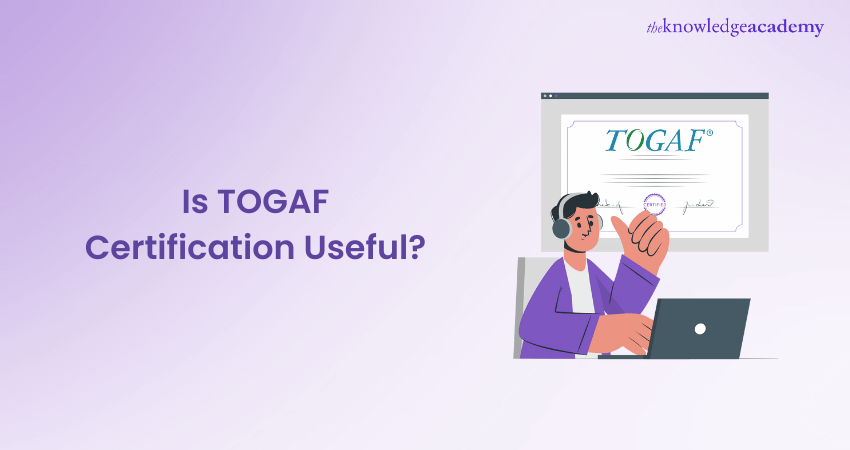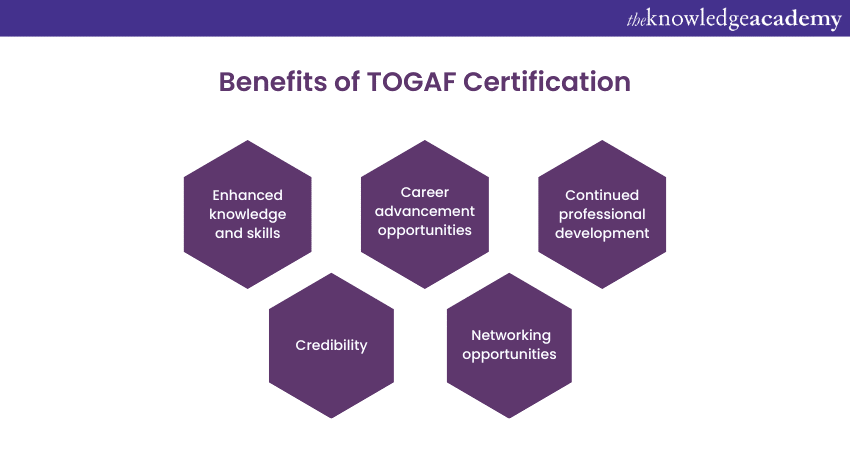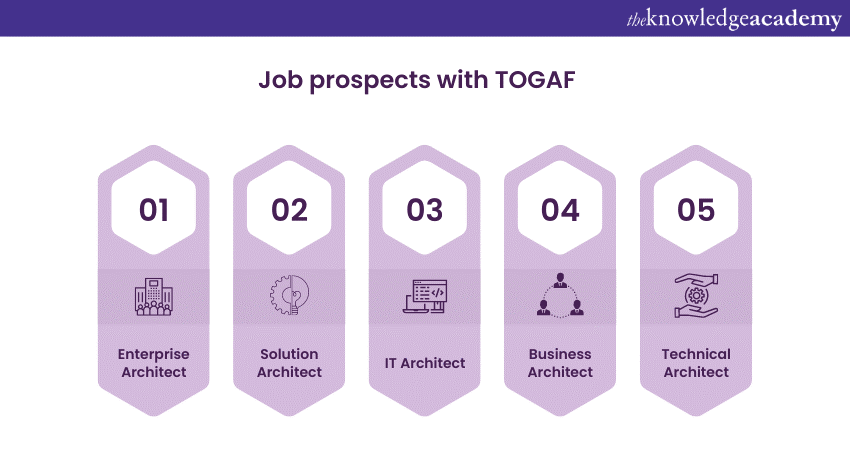We may not have the course you’re looking for. If you enquire or give us a call on 01344 203999 and speak to our training experts, we may still be able to help with your training requirements.
We ensure quality, budget-alignment, and timely delivery by our expert instructors.

TOGAF is a widely valued framework for designing, planning, implementing, and governing enterprise information technology architecture. Professionals in the field of enterprise architecture often seek certifications to validate their skills, and one of the most asked questions by them has been, ‘Is TOGAF Certification Useful?’
With its structured methodology, best practices, and tools, TOGAF equips architects with the knowledge and techniques to align IT strategy with business objectives and drive successful digital transformation.
This blog will explore various factors of the TOGAF Certification, which contributes to the significance of acquiring it in 2023.
Table of Contents
1) What is TOGAF?
2) Benefits of TOGAF Certification
3) TOGAF Certification value in 2023
4) TOGAF Certification process
5) Career opportunities with TOGAF Certification
6) Conclusion
What is TOGAF?
TOGAF is a globally acknowledged framework for enterprise architecture. It provides a structured methodology, best practices, and tools to assist organisations in designing, planning, implementing, and governing their enterprise information technology architecture.
One of the critical features of TOGAF is its Architecture Development Method (ADM), which outlines a step-by-step process for developing and managing enterprise architectures. The ADM consists of various phases, including architecture vision, business architecture, data architecture, application architecture, technology architecture, and architecture governance. Each phase offers specific guidelines, techniques, and deliverables to support architects' architectural endeavours.
Benefits of TOGAF Certification

Obtaining the TOGAF Certification offers a range of benefits for professionals in enterprise architecture. Let's explore some of the key advantages:
a) Enhanced knowledge and skills: TOGAF Certification equips professionals with the knowledge and skills to architect and design effective IT solutions that align with business objectives. Through comprehensive training and examination, TOGAF Certification ensures that architects have a solid foundation in enterprise architecture's key concepts and practices.
b) Credibility: The TOGAF Certification value is globally recognised by organisations across various industries. Employers value TOGAF-certified professionals for their proven knowledge and skills in developing and managing enterprise architectures. This recognition can lead to increased career opportunities and the ability to work on prestigious projects with organisations worldwide.
c) Career advancement opportunities: With the rapid growth of digital transformation initiatives in organisations, the demand for skilled enterprise architects is rising. TOGAF Certification opens doors to exciting career opportunities, as many companies actively seek certified professionals to drive their strategic IT initiatives.
Having a TOGAF Certification on your resume helps in setting you apart from other candidates. It reflects your commitment to professional development and ability to apply industry-standard practices in enterprise architecture.
d) Networking opportunities: TOGAF Certification connects you to a global community of enterprise architects and professionals. Through participation in TOGAF-related events, conferences, and online forums, you can expand your professional network, collaborate with peers, and exchange insights and best practices. Networking with other TOGAF-certified professionals can provide valuable learning opportunities and potential collaborations on projects.
e) Continued professional development: TOGAF Certification is not a one-time achievement but a continuous learning and development journey. The framework is regularly updated to align with industry trends and best practices.
Your TOGAF Certification value can go through periodic renewals. By staying updated with the latest version of the framework, you demonstrate your commitment to professional growth and staying at the forefront of enterprise architecture.

TOGAF Certification value in 2024
As we step into 2023, the relevance of TOGAF Certification remains high due to several factors that shape the business and technology landscape. Let's explore the current relevance of TOGAF certification:
Increasing demand for enterprise architects
Organisations worldwide recognise enterprise architecture's strategic importance in achieving their digital transformation goals. The demand for skilled enterprise architects is soaring in today's rapidly evolving business environment, where organisations strive to leverage technology for competitive advantage.
TOGAF Certification equips professionals with the knowledge and skills required to guide enterprises through the complex process of aligning their IT strategies with business objectives, making them valuable assets in the digital age.
Emphasis on digital transformation
Digital transformation is significant for most businesses across industries today. As organisations aim to embrace emerging technologies, optimise processes, and drive innovation, a robust enterprise architecture framework is critical. TOGAF provides a structured approach to support organisations in their digital transformation journeys.
It helps architects design architectures that facilitate seamless integration of new technologies, enable agility and scalability, and drive business value. TOGAF-certified professionals possess the expertise to navigate the challenges of digital transformation and ensure the successful implementation of technology initiatives.
Prepare for success with top TOGAF interview questions. Get expert insights and ace your interview today!
Alignment with industry standards and best practices
TOGAF is based on industry-recognised standards and best practices in enterprise architecture. It provides a common language and comprehensive framework that aligns with global architectural standards, ensuring organisation consistency and interoperability.
TOGAF-certified professionals are well-versed in these industry standards and best practices, enabling them to develop architectures that adhere to the highest quality and compliance standards. This alignment with industry norms reinforces the relevance and value of TOGAF Certification in 2023 and beyond.
Integration with emerging technologies
TOGAF has evolved to incorporate the integration of emerging technologies into enterprise architectures. As technologies like cloud computing, Artificial Intelligence (AI), Internet of Things (IoT), and blockchain continue to reshape industries, architects with TOGAF Certification are equipped to design architectures that leverage these technologies effectively.
They can assess the impact of emerging technologies on the organisation's IT landscape, identify opportunities for innovation, and develop architectures that support the seamless integration and optimal utilisation of these technologies.
Focus on risk management and security
Organisations significantly emphasise risk management and security in an era of increased cybersecurity threats and data privacy concerns. TOGAF addresses these concerns by incorporating risk management and security considerations into the architectural process. TOGAF-certified professionals possess the knowledge and skills to identify and mitigate risks, ensure data protection, and design architectures that comply with regulatory requirements.
Ready to become a TOGAF expert? Register for our TOGAF® Foundation And Practitioner Training Course today!
TOGAF Certification Process
The TOGAF Certification is designed to validate an individual's knowledge and understanding of the framework and its application in enterprise architecture. Various aspects of the certification include the different levels of certification, training and examination, and certification renewal. Let's explore these in detail:
Levels of certification
There are two levels of TOGAF Certification which are as follows:
1) TOGAF Foundation level: This is the first level of TOGAF certification. It provides a basic understanding of the key concepts, terminology, and principles of TOGAF. The Foundation Level certification serves as a prerequisite for higher-level certifications.
2) TOGAF Practitioner Level: This is the second level of TOGAF certification. The Certified level certification validates the ability to analyse and apply the concepts and techniques of TOGAF in real-world enterprise architecture projects.
Training and examination
TOGAF training can help candidates attempt the exam better. Let's look at the training and examination parts for TOGAF in detail:
1) Training: To prepare for TOGAF certification, individuals can attend accredited training courses offered by various training providers. These courses cover the core concepts, methodologies, and best practices of TOGAF, helping candidates build a strong foundation in enterprise architecture.
2) Examination: After completing the training, candidates can register for the TOGAF Certification examination. The examination tests the candidate's knowledge and understanding of TOGAF.
It typically consists of multiple-choice questions that assess the candidate's ability to apply TOGAF principles and concepts to different scenarios. Clearing the examination is necessary to achieve TOGAF certification.
Certification Renewal
TOGAF certifications are valid for a certain period, typically three years. To maintain their certification, individuals need to renew it periodically. Renewal involves demonstrating ongoing professional development in enterprise architecture and staying up-to-date with the latest version of TOGAF.
The renewal process may require candidates to accumulate professional development hours, attend refresher courses, or pass a renewal examination, depending on the specific requirements set by The Open Group.
Find out how TOGAF and ITIL compare to improve your IT management approach!
Career opportunities with TOGAF Certification

As a certified professional with a TOGAF Certification, you can access various exciting and fulfilling career opportunities in enterprise architecture. Let's explore some of the key roles that you can pursue with your TOGAF certification:
1) Enterprise Architect: Enterprise Architects are responsible for designing and overseeing the architecture of the entire enterprise, ensuring that technology initiatives support the organisation's goals, enhance operational efficiency, and drive innovation.
2) Solution Architect: Solution Architects focus on designing specific solutions within the enterprise architecture. They work closely with business stakeholders, project managers, and technical teams to develop innovative and efficient solutions that address specific business needs. With your TOGAF certification, you have the expertise to analyse requirements, evaluate technology options, and create solution architectures.
3) IT Architect: IT Architects are responsible for designing and managing an organisation's IT infrastructure and systems using TOGAF. They ensure that the technology landscape supports the business requirements and aligns with industry best practices.
4) Business Architect: Business Architects bridge the gap between business strategy and IT initiatives. They analyse business processes, identify areas for improvement, and design architectures that enable the organisation to achieve its strategic objectives. Your TOGAF Certification equips you with the tools and methodologies to align business and IT strategies, optimise business processes, and drive organisational change.
5) Technical Architect: Technical Architects focus on the technical aspects of the enterprise architecture, including software, hardware, networks, and databases. They design and oversee the implementation of technical solutions, ensuring that they align with the overall architecture and meet the organisation's performance and scalability requirements. They are also expected to be well trained in TOGAF architecture.
Conclusion
The TOGAF Certification has emerged as an asset for professionals in the field of enterprise architecture. We hope this blog has been helpful in answering your question ‘Is TOGAF Certification Useful?’ in 2023.
Sign up for our TOGAF® BA Foundation Training Course and unlock new possibilities in the world of enterprise architecture!
Upcoming Business Improvement Resources Batches & Dates
Date
 TOGAF® Foundation and Practitioner Training
TOGAF® Foundation and Practitioner Training
Mon 10th Feb 2025
Sat 15th Feb 2025, Sun 16th Feb 2025
Mon 17th Feb 2025
Mon 24th Feb 2025
Sat 8th Mar 2025, Sun 9th Mar 2025
Mon 10th Mar 2025
Mon 17th Mar 2025
Sat 22nd Mar 2025, Sun 23rd Mar 2025
Mon 24th Mar 2025
Mon 31st Mar 2025
Sat 5th Apr 2025, Sun 6th Apr 2025
Mon 14th Apr 2025
Sat 19th Apr 2025, Sun 20th Apr 2025
Tue 22nd Apr 2025
Mon 28th Apr 2025
Sat 3rd May 2025, Sun 4th May 2025
Tue 6th May 2025
Sat 17th May 2025, Sun 18th May 2025
Mon 19th May 2025
Tue 27th May 2025
Sat 7th Jun 2025, Sun 8th Jun 2025
Mon 9th Jun 2025
Mon 16th Jun 2025
Sat 21st Jun 2025, Sun 22nd Jun 2025
Mon 23rd Jun 2025
Mon 30th Jun 2025
Sat 5th Jul 2025, Sun 6th Jul 2025
Mon 14th Jul 2025
Sat 19th Jul 2025, Sun 20th Jul 2025
Mon 21st Jul 2025
Mon 28th Jul 2025
Sat 2nd Aug 2025, Sun 3rd Aug 2025
Mon 11th Aug 2025
Sat 16th Aug 2025, Sun 17th Aug 2025
Mon 18th Aug 2025
Tue 26th Aug 2025
Sat 6th Sep 2025, Sun 7th Sep 2025
Mon 8th Sep 2025
Mon 15th Sep 2025
Sat 20th Sep 2025, Sun 21st Sep 2025
Mon 22nd Sep 2025
Mon 29th Sep 2025
Sat 4th Oct 2025, Sun 5th Oct 2025
Mon 6th Oct 2025
Mon 13th Oct 2025
Sat 18th Oct 2025, Sun 19th Oct 2025
Mon 20th Oct 2025
Mon 27th Oct 2025
Sat 8th Nov 2025, Sun 9th Nov 2025
Mon 10th Nov 2025
Mon 17th Nov 2025
Sat 22nd Nov 2025, Sun 23rd Nov 2025
Mon 24th Nov 2025
Sat 6th Dec 2025, Sun 7th Dec 2025
Mon 8th Dec 2025
Mon 15th Dec 2025
Sat 20th Dec 2025, Sun 21st Dec 2025






 Top Rated Course
Top Rated Course


 If you wish to make any changes to your course, please
If you wish to make any changes to your course, please


